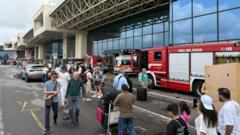German prosecutors have arrested a Ukrainian individual in Italy on suspicion of being involved in the explosive sabotage of the Nord Stream pipelines in the Baltic Sea. The arrest follows months of speculation regarding the identity and motives behind the blasts that disrupted European gas supplies.
Arrest in Italy Highlights Ongoing Mystery Surrounding Nord Stream Pipeline Explosions

Arrest in Italy Highlights Ongoing Mystery Surrounding Nord Stream Pipeline Explosions
A Ukrainian man faces charges in Italy for alleged involvement in the sabotage of the Nord Stream gas pipelines, raising questions about international tensions post-invasion.
A Ukrainian man has been arrested in Italy, where he is accused of playing a pivotal role in the destruction of the Nord Stream gas pipelines, which traverse the Baltic Sea. The individual, known only as Serhii K, was apprehended in the Rimini area and is believed to have been part of a larger operation aimed at sabotaging the pipelines linking Russia to Germany.
According to German federal prosecutors, Serhii K is suspected of masterminding the attack alongside a group that chartered a yacht to execute the operation from the German port of Rostock. The attacks have raised international concern, particularly given Ukraine's ongoing conflict with Russia and the critical role that these pipelines played in the European natural gas supply chain.
Following the blasts on September 26, 2022, which damaged three of the four Nord Stream pipelines, investigations have been launched, yet the identity of the saboteurs remained elusive for months. Although Ukrainian officials have denied any involvement, reports in Germany previously suggested the likelihood of Ukrainian divers utilizing a rented yacht to conduct the sabotage.
In the wake of this latest arrest, prosecutors stated that Serhii K would be extradited to Germany, where a judge will review the charges against him, including those related to sabotage and conspiracy to undermine the constitution. So far, there has been no definitive evidence implicating Ukraine, Russia, or any other nation in the attack, leaving the narrative shrouded in uncertainty and fueling ongoing discussions about geopolitical tensions in the region.



















